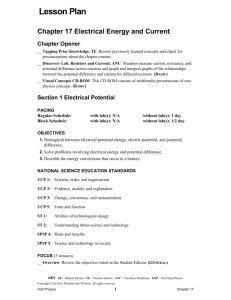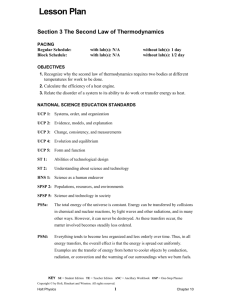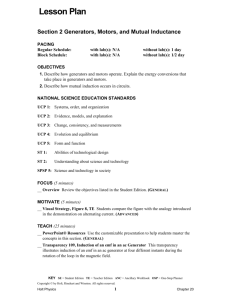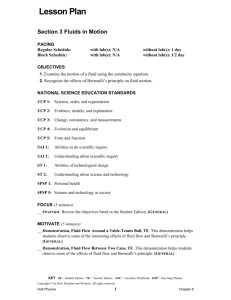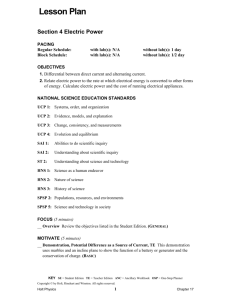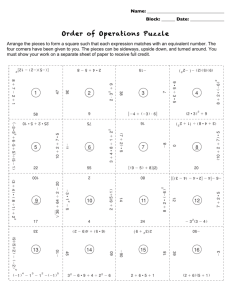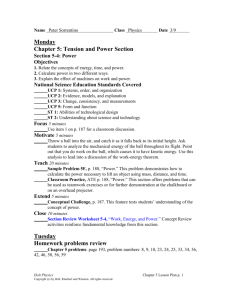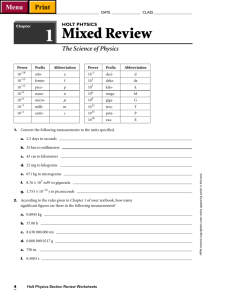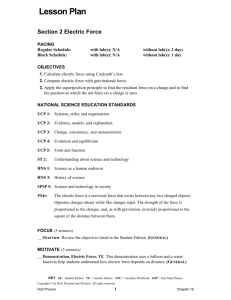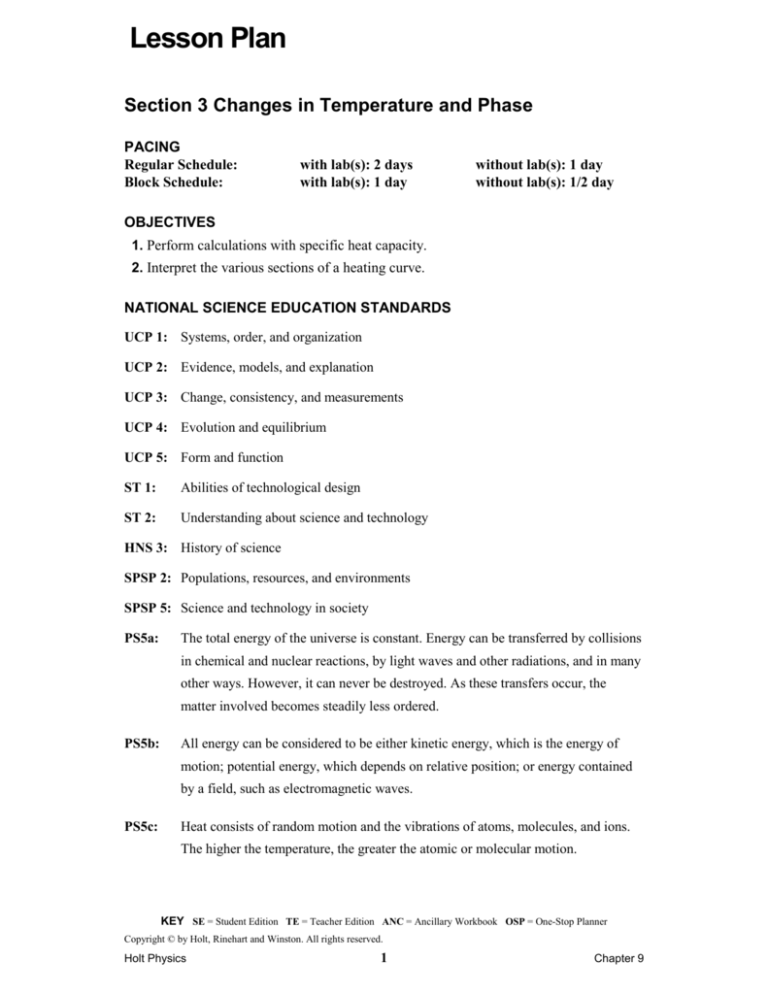
Lesson Plan
Section 3 Changes in Temperature and Phase
PACING
Regular Schedule:
Block Schedule:
with lab(s): 2 days
with lab(s): 1 day
without lab(s): 1 day
without lab(s): 1/2 day
OBJECTIVES
1. Perform calculations with specific heat capacity.
2. Interpret the various sections of a heating curve.
NATIONAL SCIENCE EDUCATION STANDARDS
UCP 1: Systems, order, and organization
UCP 2: Evidence, models, and explanation
UCP 3: Change, consistency, and measurements
UCP 4: Evolution and equilibrium
UCP 5: Form and function
ST 1:
Abilities of technological design
ST 2:
Understanding about science and technology
HNS 3: History of science
SPSP 2: Populations, resources, and environments
SPSP 5: Science and technology in society
PS5a:
The total energy of the universe is constant. Energy can be transferred by collisions
in chemical and nuclear reactions, by light waves and other radiations, and in many
other ways. However, it can never be destroyed. As these transfers occur, the
matter involved becomes steadily less ordered.
PS5b:
All energy can be considered to be either kinetic energy, which is the energy of
motion; potential energy, which depends on relative position; or energy contained
by a field, such as electromagnetic waves.
PS5c:
Heat consists of random motion and the vibrations of atoms, molecules, and ions.
The higher the temperature, the greater the atomic or molecular motion.
KEY SE = Student Edition TE = Teacher Edition ANC = Ancillary Workbook OSP = One-Stop Planner
Copyright © by Holt, Rinehart and Winston. All rights reserved.
Holt Physics
1
Chapter 9
Lesson Plan
FOCUS (5 minutes)
__ Overview Review the objectives listed in the Student Edition. (GENERAL)
MOTIVATE (5 minutes)
__ Teaching Tip, p. 313, TE Students consider two masses of air and water and guess
which one has the greater specific heat capacity based on its temperature increase.
(GENERAL)
__ Visual Strategy, Figure 13, TE Students answer why water is used in a calorimeter.
(GENERAL)
TEACH (70 minutes)
__ PowerPoint® Resources Use the customizable presentation to help students master the
concepts in this section. (GENERAL)
__ Transparency 36, A Simple Calorimeter This transparency illustrates the basic
components of a simple calorimeter.
__ Transparency 37, Temperature Change of Ice, Water, and Steam with Added Energy
This transparency shows how the temperature of 10.0 g of ice changes as energy is added.
__ Transparency Master 32A, Specific Heat Capacities This transparency master lists
specific heat capacities that have been determined for several substances.
__ Transparency Master 33A, Latent Heats of Fusion and Vaporization This
transparency master lists latent heats for a few substances.
__ Sample Set C, Calorimetry, SE This sample and practice problem set covers
calorimetry. (GENERAL)
__ Classroom Practice, Calorimetry, TE Use these problems as a teamwork exercise or for
demonstration at the board or on an overhead projector. (GENERAL)
__ Visual Strategy, Figure 14, TE Students answer questions about the shape of the graph
shown on the page. (GENERAL)
__ Appendix J: Advanced Topics, Latent Heat, SE This feature allows students to explore
higher-level concepts related to the chapter. (ADVANCED)
__ Skills Practice Lab, Specific Heat Capacity, SE Students identify various metals using
calorimetry. (GENERAL)
__ Datasheet, Specific Heat Capacity, ANC Students use the datasheet to complete the intext lab. (GENERAL)
CLOSE (10 minutes)
__ Section Review, SE Students answer review questions, critical-thinking questions, and
interpreting-graphics questions that assess their understanding of the section objectives.
(ADVANCED)
__ Study Guide, Changes in Temperature and Phase, ANC Use this worksheet to review
the main concepts presented in the section. (GENERAL)
KEY SE = Student Edition TE = Teacher Edition ANC = Ancillary Workbook OSP = One-Stop Planner
Copyright © by Holt, Rinehart and Winston. All rights reserved.
Holt Physics
2
Chapter 9
Lesson Plan
__ Section Quiz, ANC Use this quiz to assess students' understanding of the section.
(GENERAL)
OTHER RESOURCE OPTIONS
__ Holt Online Learning Students can access interactive problem-solving help and active
visual concept development with the Holt Physics Online Edition available at
go.hrw.com.
__ Problem Workbook, Sample Set C: Calorimetry, ANC This worksheet provides an
additional example problem and several practice problems that cover calorimetry.
(GENERAL)
__ Problem Bank, Sample Set C: Calorimetry, OSP This worksheet provides a third
example problem and several practice problems that cover calorimetry. (GENERAL)
__ Practice Problems, Online Students can visit go.hrw.com and enter the keyword
HF6HATX to find a sample problem and practice problems covering latent heat. Teacher
resources can be found by entering the keyword HF6HATXT. (ADVANCED)
__ Integrating Earth Science, Land and Sea Breezes, Online Students can visit
go.hrw.com and enter the keyword HF6HATX to find this activity. Teacher resources
can be found by entering the keyword HF6HATXT. (GENERAL)
__ CBL Lab, Specific Heat Capacity, SE This is a CBL version of the end-of-chapter
Skills Practice Lab. (GENERAL)
__ CBL Experiment, Specific Heat Capacity, ANC In this Skills Practice CBL lab,
students identify various metals using calorimetry. (GENERAL)
__ SciLinks, Online Students can visit www.scilinks.org to find internet resources related
to the chapter content.
Topic: Specific Heat Capacity
SciLinks Code: HF61694
__ SciLinks, Online Students can visit www.scilinks.org to find internet resources related
to the chapter content.
Topic: Heat Pumps
SciLinks Code: HF60730
KEY SE = Student Edition TE = Teacher Edition ANC = Ancillary Workbook OSP = One-Stop Planner
Copyright © by Holt, Rinehart and Winston. All rights reserved.
Holt Physics
3
Chapter 9
Lesson Plan
End of Chapter Review and Assessment
PACING
Regular Schedule:
Block Schedule:
with lab(s): N/A
with lab(s): N/A
without lab(s): 2 days
without lab(s): 1 day
__ Chapter Highlights, p. 321, SE This page summarizes the vocabulary terms and key
concepts of the chapter.
__ Chapter Review, pp. 322–325, SE Students review the chapter material with review
questions, conceptual questions, practice problems, and a mixed review section.
__ Alternative Assessment, p. 325, SE These projects challenge students to apply and
extend concepts that they have learned in the chapter. (ADVANCED)
__ Graphing Calculator Practice, p. 324, SE Students program their graphing calculators
to determine the temperature of a piece of aluminum foil that absorbs various amounts of
energy. (GENERAL)
__ Standardized Test Prep, pp. 326–327, SE This feature helps students sharpen their testtaking abilities while reviewing the chapter content. (GENERAL)
__ Appendix D: Equations, p. 858–859, SE This appendix summarizes the equations
introduced in the chapter.
__ Appendix I: Additional Problems, pp. 887-888, SE This appendix provides additional
mixed practice problems that cover the equations introduced in the chapter.
__ Study Guide, Mixed Review, ANC Students can use this worksheet to review the main
concepts of the chapter in preparation for the chapter test. (GENERAL)
__ Holt PuzzlePro® Use this software to create crossword puzzles and word searches that
make learning vocabulary fun.
__ Chapter Test A, ANC Assign this test for general-level chapter assessment. (GENERAL)
__ Chapter Test B, ANC Assign this test for advanced-level chapter assessment.
(ADVANCED)
__ Test Generator Create a customized homework assignment, quiz, or test using the
ExamView® Test Generator.
__ Test Item Listing, OSP The Holt Physics Test Generator contains a file of test items for
each chapter of the textbook. This Test Item Listing is a print-out of all the test items in
the Test Generator for this chapter.
OTHER RESOURCE OPTIONS
__ Scientific American, Online For advanced-level project ideas from Scientific American,
students can visit go.hrw.com and type in the keyword HF6SAE.
KEY SE = Student Edition TE = Teacher Edition ANC = Ancillary Workbook OSP = One-Stop Planner
Copyright © by Holt, Rinehart and Winston. All rights reserved.
Holt Physics
4
Chapter 9

